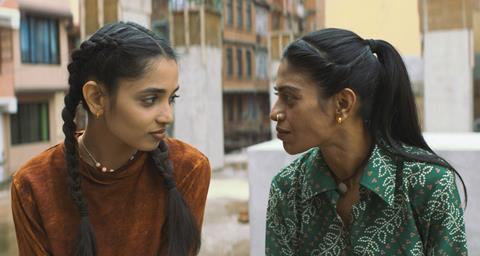Konstantin Bojanov moves to India for this drama about a forbidden relationship between a sex worker and a younger girl

Dir/scr: Konstantin Bojanov. France/Switzerland/Bulgaria/Taiwan/India. 2024. 115mins
A character study mixes with forbidden romance and thriller conventions in the latest film from Bulgarian-American director Konstantin Bojanov which, though stylishly shot and anchored by a pair of strong performances, feels diffuse in terms of storytelling. Bojanov’s road trip drama debut Avé played in Cannes’s Critics’ Week in 2011 and now he returns to the festival’s Un Certain Regard section. Prospects further along the line are likely to lie with genre festivals and streaming platforms.
If the plotting has a certain inevitability, it is lifted by the general artistry on display
When we meet sex worker Renuka (Anasuya Sengupta), she is holding a knife in her hand, a dead body lying behind her in the brothel where she works. The steely determination of her character is immediately evident as she calmly cleans herself up and walks out of the place on a pretext, before fleeing Delhi’s GB Road red light district for the smaller town of Chhatarpur. After finding a new place to ply her trade, she becomes drawn to the much younger Devika (Omara Shetty), whose mother (Auroshikha Dey) is planning to prostitute her out in the way her own mother (Mita Vashisht) did with her.
Bojanov has said this project originally began as a documentary. Although the end result is a long way from neorealism, the (now outlawed) tradition of devadasi remains in the background. The practise saw young girls dedicated to a goddess, with service to her largely involving being sold out for sex work and with the taking of virginity – inevitably, highly prized. It’s an idea which is hinted at more than spelled out by Bojanov, who also dabbles in the tensions between the Hindu and Muslim communities but again doesn’t fully commit to the topic. The latter issue is largely presented through Dinesh (Rohit Kokate), a villainous politician whose sexual appetites bring nothing but trouble for Renuka and Devika.
The colour palette is that of an erotic thriller, with hot reds and pinks strikingly shot by Gabriel Lobos (Blue My Mind) against cooler blues, although the interactions between Renuka and Devika are largely suggestive rather than full throttle. The costuming from Parul Sondh – who is also responsible for the detailed production design – adds to the central pairing by contrasting Renuka’s fashionable patterned and silk shirts with the knitwear in which the younger woman hides her shape from potential suitors.
Devika also has episodes in which she faints or, in moments of stress, slips into a sort of trance-like state filled with violent visions. This has also worked to her advantage as they have led her family to hesitate to sell her out. While adding to the general thriller mood, these moments are less successful dramatically as they are never explained, and seem more of a convenience to move the plot along than fully connected to Devika’s character.
The narrative structure would also benefit from tightening, as Bojanov becomes torn between his drama’s various flashpoints – from Devika’s home situation to the on-the-run status of Renuka and the suggestion of the older woman’s various addictions – so that the tension never has time to fully build in one area before he moves to the next.
While the plot becomes rather too overwrought for its own good – perhaps a result of the being in development since 2016 – Sengupta is never less than compelling in her first screen role. Her background is in production design but she proves equally capable of crafting a believable character. Her angular performance initially comes across as predatory towards Devika and it is a shame the moral complexity of their difference in age and experience is not further explored. Nevertheless, Sengupta makes the softening of the relationship between the pair believable as her character’s attraction to the younger woman grows. Though Devika is less detailed, the gentler turn from Shetty, particularly as her character begins to grow in confidence, dovetails nicely with that of Sengupta.
If the plotting has a certain inevitability, it is lifted by the general artistry on display and, particularly, the performance by Sengupta. Hopefully this won’t be the last time she steps in front of the camera rather than working behind the scenes.
Production companies: Akka Films, Urban Factory, Klas Film, House On Fire, Team Productions HQ Limited (TPHQ)
International sales: Urban Group, florencia@urbangroup.biz
Producers: Nicolas Wadimoff, Philippe Coeytaux, Severine Pisani, Palmyre Badinier, Frederic Corvez, Maeva Savinien, Rossitsa Valkanova, Vincent Wang, Mohaan Nadaar, Deepti Chawla
Cinematography: Gabriel Lobos
Production design: Parul Sondh
Editing: Tom Hsin Ming Lin
Music: Petar Dundakov
Main cast: Anasuya Sengupta, Omara Shetty, Auroshikha Dey, Rohit Kokate, Kiran Bhivagade, Tanmay Dhanania, Mita Vashisht
























